By Sally Deering
All photos by Leila Bowie 2012Â
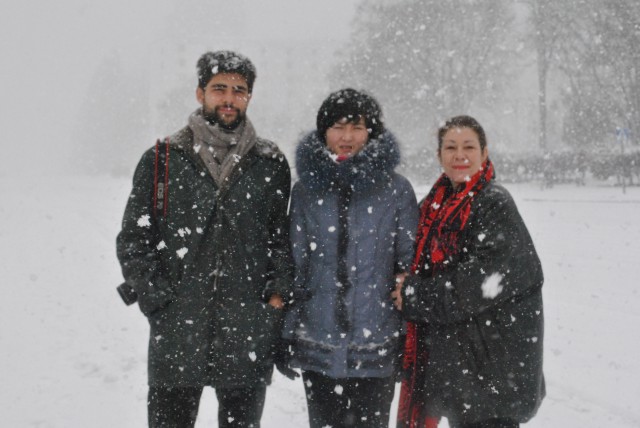
Growing up in Jersey City, Leila Bowie dreamed of traveling the world and once she set out to accomplish her dream, Bowie traveled to more than 25 countries including her most recent trip to North Korea.
 “I’ve lived in Tokyo and Australia, and I’ve been to Thailand, Indonesia, Shanghai Beijing, Pakistan, and all over Europe,†Bowie says. “I think I inherited my passion for traveling from my grandfather who was born in Louisiana and part of a traveling circus. I knew I wanted to travel the world by the age four or five.â€
 In December, accompanied by her son, Nile Bowie, a TV correspondent based in Malaysia, Leila traveled to North Korea and took pictures of the countryside and its capital city Pyongyang during her 11-day stay. Although tourism is controlled by the government – approximately 1,500 tourists are allowed in each year— Leila and Nile visited historic landmarks in Pyongyang and country villages outside the city – always accompanied by a tour guide. Leila says: “They never let you go anywhere without guides.â€
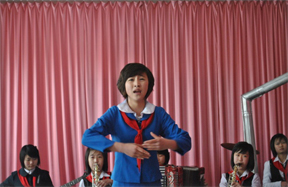
North Korea
Leila Bowie 2012
Â
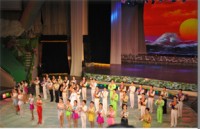
Leila Bowie 2012

Leila Bowie 2012
Everywhere she went, Leila Bowie took photographs of what she saw, sometimes from the window of a moving car. Bowie has exhibited her photographs in New York and has four pieces in the Brooklyn Museum’s permanent collection.
 “Visiting North Korea was an interesting experience,†Bowie says. “I was in the north and the south and we were in a blizzard. Everyone has to clear the miles of roads from ice and snow. People are out there chopping at the ice with tiny shovels the size you would give kids at the seashore. Once we were in folklore village, there was no electricity, no heat; we were freezing.â€
 During her stay, Bowie felt constantly barraged by the voices heard on loudspeakers which are everywhere and on from sunrise to sunset.
 “Every apartment has a loudspeaker,†Bowie says. “It can be turned down but not turned off. You always hear propaganda, speeches, all the waking hours of the day, and always different voices, but mostly male voices; and some music, too.â€
Â
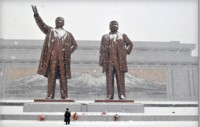
North Korea
Leila Bowie 2012
Touring the capital city of Pyongyang, Bowie says it was bustling with people traveling on bicycles, trolleys and subways. And everywhere she went, the locals were friendly and curious. She and her son were even invited to see a musical presentation.
 “We were taken to a school and treated to an opera by five or six young women,†Bowie says. “Their voices and instruments and the way the children performed was incredible. After school the children were cleaning the schoolyard of snow.â€
 Bowie and her son were the only Americans on the DMZ, she says, where a five-star colonel gave them a tour.
 “They took us where the treaty was signed and the colonel made reference to the fact that my son and I were Americans,†Bowie says.
 During her visit to North Korea, Bowie was surprised that government officials didn’t stamp her passport.
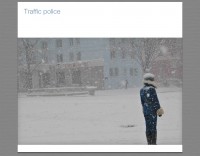
North Korea
Leila Bowie 2012
 “They give you a tourist visa to give back at the end of the stay,†Bowie says. “There’s no record. My passport doesn’t say anything. Nobody knows that I’ve been there. We had to pass through several checkpoints, but they never gave us a problem.â€
 For all its mystery, North Korea provided Bowie with excellent medical care when she got sick toward the end of her trip.
 “I stayed a few extra days because I was put in the hospital with septic poisoning,†Bowie says. “It was awful. We didn’t think I was going to live. I was in a hospital for foreign diplomats and the healthcare was wonderful. They took very good care of me.â€
Back home, for now, Bowie says she would like to go back to her favorite country Thailand and open a free school to teach English to the girls who live in the mountains. Bowie relates more to the everyday people, she says, no matter where she visits.
 “I’ve lived in pool halls, I slept in rice bins,†Bowie says. “I’d rather be with the villagers. I’ve been so welcomed, people have taken me into their homes to live. It’s been amazing. I’m lucky I guess. One guy was holding me hostage on a camel but after a few choice words, he let me off the camel. At the time I was a 23 year-old New Yorker in Egypt. â€
 Â
Â
Â
Â
